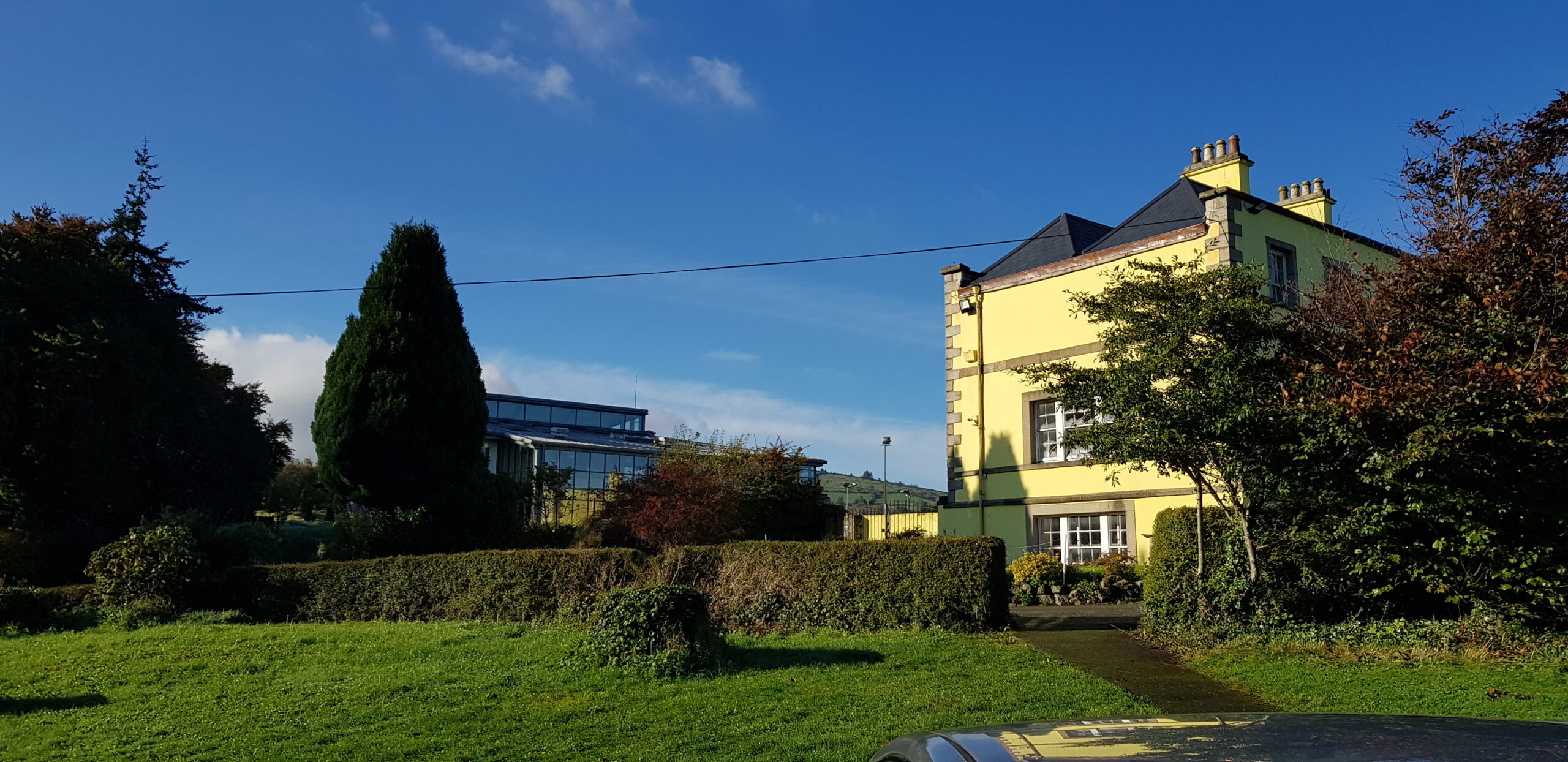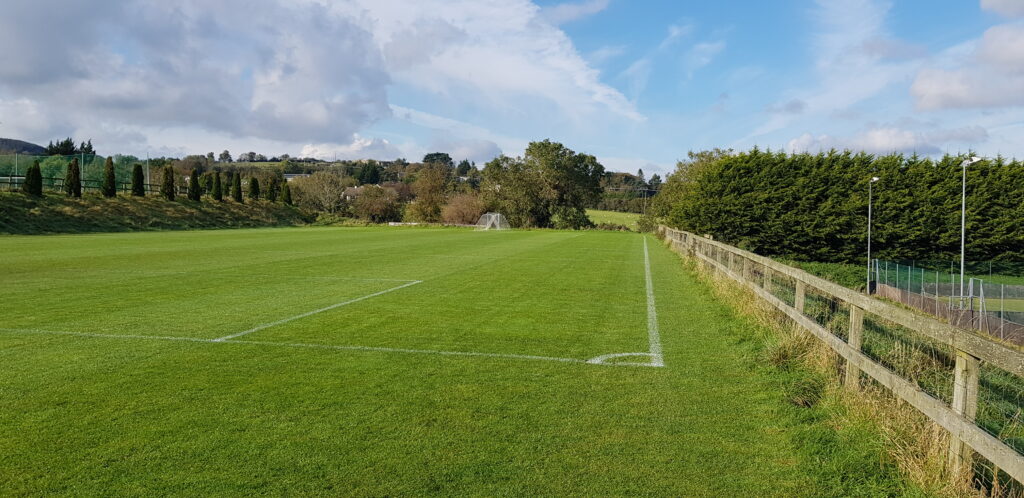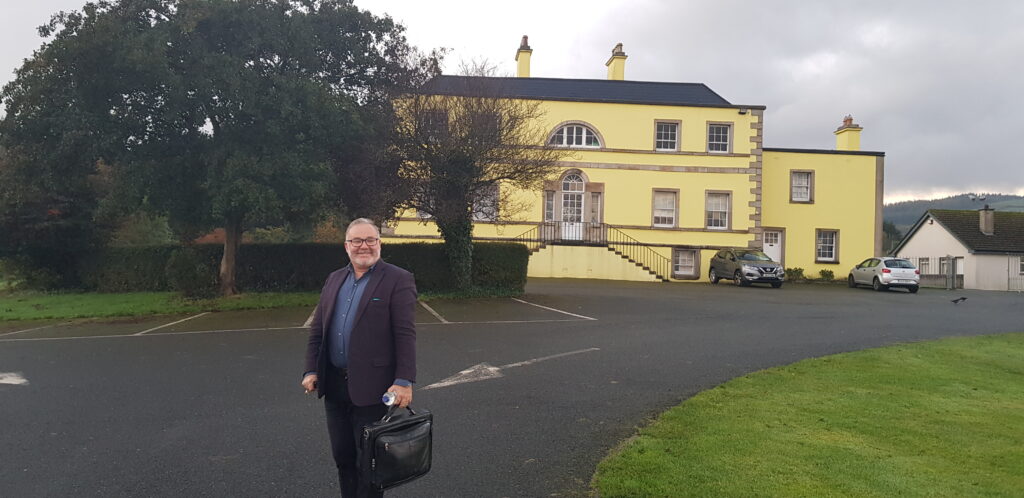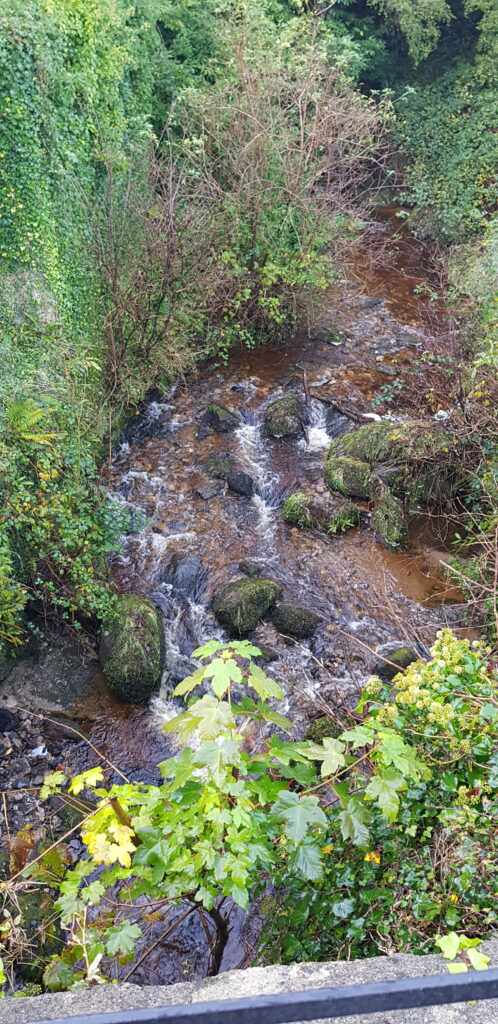Seán Thompson angol szakos kollégánk, aki anyanyelvi lektorként is dolgozik iskolánkban, 2023 októberében szakmai látogatáson járt a dublini Rockbrook Park Schoolban. Angol nyelvű beszámolója a mobilitásról itt olvasható:
One of my main objectives was to see how Irish teachers could organise their 40-minute lessons’ well providing enough knowledge to assist pupils with their text books. Through the professionalism and technology used in the classroom, it is clear that a lot can be achieved a relatively short time.
Seeing a biology lesson both in the classroom and outside was superb as careful planning and knowledge of the natural surroundings in the school is a must. The use of worksheets and specimen jars focused pupils’ attention on work in hand and gave no time for disruption.
Meeting the manager of Rockbrook International (not the school) was eye-opening due to the amount of paying foreign pupils he brings into the school to help with running costs and educating those pupils to a native level of English. Finding out how these young foreign pupils adapt and study was a plus point.
Checking sports facilities and training methods and a P.E. lesson proved to be very different to Hungary as all pupils play outside no matter what the weather. As the lessons are short, the P.E. teacher allows pupils to play football, padel, table tennis in one lesson and trains them in the extra-curricular activities after school. On other days he takes them cross-country running and orienteering where more 21st century skills are needed and not just the physical ability.
The mentoring system at Rockbrook was also a great point of learning as each individual pupil has a mentor who directs and checks progress continually. This forces the pupil to make changes in studying strategies and developmental skills.
In one particular Geography lesson for exam leaving pupils, the teacher, Paul Whinnery went through a whole host of exam techniques and how to answer questions correctly. As an examiner as well, he asked exam-based questions connected to the geography text book, which students were invited to answer. Where students failed to answer correctly, Paul filled in and showed them exactly what the interlocutor requires. This gave me deep insights into what is required. Points such as stating the obvious are important as the examiner is not the teacher and so needs some deeper more background information. Paul also went through the marking and allocation of points so as to aid more thorough answers for greater points and basic sentences for one-point questions. What was also very prevalent in most subjects I observed was the so-called ‘Learning attentions’ meaning ‘By the end of the lesson/chapter, you will be able to…’. As I also teach Geography through my General Science lesson, these points were of great benefit as well as the use of geo-literacy.
I also viewed a science lesson for 12-year-old pupils, which proved to be a great help. Just to see the Science laboratory was amazing due to the décor and facilities. What is quite typical in Irish schools is the crossover or the cross-curricular involvement i.e. the art teacher getting pupils to create a papier mâché solar system for the lab. This enables the science teacher to explain the planets etc. in a more hands-on way while the pupils can be proud of their own work. The lesson was actually a half-term revision one, and so the teacher requested pupils to make a mind map of the topic of ‘Separating mixtures’. While pupils filled out the mind map, they were invited to explain each point on the map compromising of six subtopics. What was notable about the teacher’s input was not just the correction of any misunderstood notions, but his drawing of symbols and apparatus used in such experiments of separation. There were more revision tasks and then a quiz on numbers and values connected to calculations. The pupils are familiar with Kahoot and other online platforms, but they are only allowed access through tablets and mobile phone usage is banned.
Another lesson which I observed was entitled Great Questions which is best described as a philosophy cum English lesson for the 12–13-year-old pupils. The idea is to challenge pupils to think for themselves and learn how to debate more complicated matters which affect them now or later in their teens. The lesson I visited was entitled, ‘How to measure success?’. The previous lesson and homework had been for pupils to create a story about themselves in connection to wealth, having fame and social media. This was a build up to the lesson I saw with more ideas taken from a TEDx talk by Cal Newport. The video was 14 minutes’ long and pupils had to answer a number of questions previously written down in connection to the video.
What was cleverly worked out was that Cal Newport was all for quitting the use of social media and the questions were actually to give reasons why one should not quit. The main point I could see was that pupils were being informed about how long the actually spend on SM and the effect it has on their success, behaviour and negative impact that it can cause. Many opposites were given such as dropping SM for the opportunity to get involved in deep work or craftmanship which is disappearing nowadays. All-in-all many aspects were presented but in no way did Miles Cassidy the teacher give his opinion. He made suggestions and offered assistance but the ‘Great question’ had to be answered by each individual pupil. This was actually a feature of many different lessons I saw in that teachers led the lesson and showed the way forward without giving an opinion.
Another lesson of measurable quality was Rhetoric with William O’Brien. This is seen as a classical subject but it certainly has its part to play for debating and presenting. The pupils were roughly 12-13 and the teacher’s aim was to get them to write persuasive sentences using ethos. The lesson followed the lines of classic Greek and Roman ideas of rhetoric, which have not changed in thousands of years. Pupils were invited to ask questions and explore ideas connected to a set of photos projected on the whiteboard. What I could learn here was the energy and alertness of the teacher, which was always at the highest level. His knowledge and ability to define words and ideas to young teens was incredible. His movement, standing and sitting was all part of the lesson too. He knew when to sit and tell a short story/example and when to walk and talk. Speech and lesson organisation was excellent as a lesson is only 40 minutes which includes getting to the class on time and sitting down and unpacking. Once again, the use of an iPad was invaluable as the teacher could plan and write information for the following task while pupils were busy writing their persuasive sentences. The teacher then projected these new ideas and elements of persuasive sentences making the best use of time and technology. I believe this lesson although entitle Rhetoric, could be used in my English lessons as I can cover similar convincing arguments in my lessons too.
The most notable point of Rockbrook Park School is the organisation and professionalism of the staff. Things happen swiftly and problems are resolved without complaining or blaming. There was always a solution to a new issue that arose. For instance, some 13-year-old boys had to receive inoculations and so lessons were cancelled or had to be conducted with more understanding due to some boys physically reacting badly (i.e. soreness in the arm, fainting) thus not being able to fully participate in lessons. The staff involved under the head’s direction already knew what the procedure was for such issues and so life in the school went on.
Another feature was discipline or how teachers responded to the issue. On a low level my Tuesday morning viewing of the first lesson saw the late arrival of a good number of pupils. Both teacher and pupils conducted themselves with the appropriate language. First the teacher, Miles Dempsey was not perturbed and allowed pupils to enter the classroom. The boys in question stated that the bus was late due to an accident and sat down without any disturbance. The teacher asked one boy to take off his coat as well. Also in another lesson, William O’Brien’s Great Questions lesson a boy gave a one-word answer and was immediately told so. The same boy later answered a question that was required from a different pupil. The teacher again gently warned the boy to wait and allow those questioned to answer. There were other small incidents during lessons which caused a response and not a reaction from the teacher. As there are lessons directed towards behaviour i.e. Men of character and school assemblies, it is clear that a set of rules exists which make the engagement of issues ‘reaction free’ due to a common understanding that is well-known amongst staff and pupils.
My own competence has also grown in seeing how Irish teachers use technology in the class to save time and make lessons more visually appealing. Nearly all teachers had iPads using mirror technology and so no time was wasted writing on a board after a film was shown, but rather the teacher was writing questions connected to the film while pupils were watching and then mirrored them. In fact, even though the teacher was well-prepared, he could still connect new ideas and thoughts quickly with a written record on the iPad and keep pupils focused on both film and question. I intend to develop with my response to pupils and technological abilities in the near future.
Due to the fact that there were a good number of lessons that focused on elements of philosophy and rhetoric, I believe I can build them into my English lessons. Rhetoric is part of teaching English and the idea of learning how to persuade people and the lexis involved is good for a few 45-minute lessons. The history can be taught i.e. the 5 Roman rules of rhetoric, which include creativity, organisation, delivery and style. Through this one can use all the points for making great PowerPoint presentations and debating.
Another lesson entitled ‘Great Questions’ is basically a philosophy lesson twice a week with the aim to discuss and debate many current affairs or social issues throughout the year. What is important to note is that the curriculum is not a running one, but a fixed one prepared in the summer before the onset of the school year. Such questions arose as to what effect does social media have on the youth. This lesson could easily be incorporated into the bilingual programme for English as no necessary previous knowledge is needed to be built upon. I only need to supply a good vocabulary list for students to explain themselves and their thoughts.
Another great finding was how Rockbrook Park School deals with discipline issues. In one particular lesson a student who was having issues had to hand in his ‘Journal’ in at the end of every lesson for the subject teacher to check. The journal consisted of days of the week and lesson times to which disciplinary issues i.e. punctuality, general behaviour, activeness etc. were added. The subject teacher went through the list ticking the relevant boxes indicating whether or not the student had fulfilled his duties. This could be introduced so as to keep track of students and stop them from deteriorating.
A highlight of the week, however, was that in the first real break at 11.00am, all the teachers gathered for tea, coffee and a snack to chat and enjoy each other’s company. This was not to talk about student issues as such but to socialise with one another. Two staffrooms exist at Rockbrook; a working one with computers and a social one for chatting and eating. We could easily set-up similar or at least have break designed for socialising and not doing school duties.





